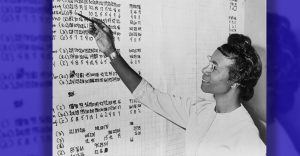Uncategorized
BOOK REVIEW: “The Case for Loving: The Fight for Interracial Marriage”
Your best friend’s Mom never minds if you make too much noise.
She takes you places and gives you snacks, too. She’s a really nice lady.
Your best friend’s Dad shows you how to do things, and he makes you laugh. You like spending time at their house.
 
But what if there was a rule somewhere that said they couldn’t be a family? In “The Case for Loving” by Selina Alko, illustrated by Sean Qualls and Selina Alko, there was once such a law, and the reason was Black and white.
Falling in love was very easy. Richard Loving and Mildred Jeter did that right after they met, and it didn’t take long for them to decide that they wanted to get married and raise a family.
But there was one problem: Richard was white. Mildred was “colored.” They didn’t think that was any big deal, but in Virginia in 1958, it was illegal for them to get married. Yes, a simple wedding could land them in jail!
So Mildred and Richard went to Washington , D.C. and tied the knot there. Family and friends went to the wedding, and everybody was happy. The Lovings “couldn’t wait” to start their new lives back home.
Not long after they were back in Virginia , though, the police came in the middle of the night and said that the Lovings’ marriage certificate was no good. They put Richard and Mildred behind bars because their marriage was unlawful – and that “was just awful!”
In order to stay out of jail for good, Richard and Mildred had to leave their families and move to another state.
In Washington , D.C. again, the Lovings tried to settle in. Richard got a job. Mildred had three children in “three different shades of milk-chocolate brown.”
But the city wasn’t a good place for the Lovings. They missed their families. They weren’t happy so, nine years after that late-night visit by the police, because times had changed, they hired lawyers to fight for the right to live in their beloved Virginia.
For any adult who’s too young to remember Loving v. Virginia (or any child who wasn’t born then), “The Case for Loving” is a very informative, eye-opening book.
Author Selina Alko says in her notes that, as a Jewish white woman, she finds it “difficult to imagine” that her marriage (to illustrator Sean Qualls, an African American) might’ve been illegal, 50 years ago. Kids might find that notion to be almost “unbelievable,” too, given that they’ve never known a world like one described here.
What parents will want to understand, however, is this: for its 4-to-8-year-old target age group – particularly for those on the younger end – this book could be scary, especially the “taken away and locked up in jail” part.
For toddlers, that’s the stuff of nightmares. So be warned.
Still, if you’re prepared to explain and you keep the youngest audience members in mind, this could be a great read-aloud book. “The Case for Loving” may become one your kids will make noise for.
“The Case for Loving: The Fight for Interracial Marriage,” by Selina Alko, illustrated by Sean Qualls and Selina Alko, c. 2015, Arthur A. Levine Books/Scholastic Press, $18.99, 40 pages.
Uncategorized
Oakland Housing and Community Development Department Awards $80.5 Million to Affordable Housing Developments
Special to The Post
The City of Oakland’s Housing and Community Development Department (Oakland HCD) announced its awardees for the 2024-2025 New Construction of Multifamily Affordable Housing Notice of Funding Availability (New Construction NOFA) today Five permanently affordable housing developments received awards out of 24 applications received by the Department, with award amounts ranging from $7 million to $28 million.
In a statement released on Jan. 16, Oakland’s HCD stated, “Five New Construction Multifamily Affordable Housing Development projects awarded a total of $80.5 million to develop 583 affordable rental homes throughout Oakland. Awardees will leverage the City’s investments to apply for funding from the state and private entities.”
In December, the office of Rebecca Kaplan, interim District 2 City Councilmember, worked with HCD to allocate an additional $10 Million from Measure U to the funding pool. The legislation also readopted various capital improvement projects including street paving and upgrades to public facilities.
The following Oakland affordable housing developments have been awarded in the current round:
Mandela Station Affordable
- 238 Affordable Units including 60 dedicated for Homeless/Special Needs
- Award: $15 million + previously awarded $18 million
- Developer: Mandela Station LP (Pacific West Communities, Inc. and Strategic Urban Development Alliance, LLC)
- City Council District: 3
- Address: 1451 7th St.
Liberation Park Residences
- 118 Affordable Units including 30 dedicated for Homeless/Special Needs
- Award: $28 million
- Developer: Eden Housing and Black Cultural Zone
- City Council District: 6
- Address: 7101 Foothill Blvd.
34th & San Pablo
- 59 Affordable Units including 30 dedicated for Homeless/Special Needs
- Award: $7 million
- Developer: 34SP Development LP (EBALDC)
- City Council District: 3
- Address: 3419-3431 San Pablo Ave.
The Eliza
- 96 Affordable Units including 20 dedicated for Homeless/Special Needs
- Award: $20 million
- Developer: Mercy Housing California
- City Council District: 3
- Address: 2125 Telegraph Ave.
3135 San Pablo
- 72 Affordable Units including 36 dedicated for Homeless/Special Needs
- Award: $10.5 million
- Developer: SAHA and St. Mary’s Center
- City Council District: 3
- Address: 3515 San Pablo Ave.
The source of this story is the media reltations office of District 2 City Councilmember Rebecca Kaplan.
Activism
Oakland Housing and Community Development Department Awards $80.5 Million to Affordable Housing Developments
In a statement released on Jan. 16, Oakland’s HCD stated, “Five New Construction Multifamily Affordable Housing Development projects awarded a total of $80.5 million to develop 583 affordable rental homes throughout Oakland. Awardees will leverage the City’s investments to apply for funding from the state and private entities.”

Special to The Post
The City of Oakland’s Housing and Community Development Department (Oakland HCD) announced its awardees for the 2024-2025 New Construction of Multifamily Affordable Housing Notice of Funding Availability (New Construction NOFA) today Five permanently affordable housing developments received awards out of 24 applications received by the Department, with award amounts ranging from $7 million to $28 million.
In a statement released on Jan. 16, Oakland’s HCD stated, “Five New Construction Multifamily Affordable Housing Development projects awarded a total of $80.5 million to develop 583 affordable rental homes throughout Oakland. Awardees will leverage the City’s investments to apply for funding from the state and private entities.”
In December, the office of Rebecca Kaplan, interim District 2 City Councilmember, worked with HCD to allocate an additional $10 Million from Measure U to the funding pool. The legislation also readopted various capital improvement projects including street paving and upgrades to public facilities.
The following Oakland affordable housing developments have been awarded in the current round:
Mandela Station Affordable
- 238 Affordable Units including 60 dedicated for Homeless/Special Needs
- Award: $15 million + previously awarded $18 million
- Developer: Mandela Station LP (Pacific West Communities, Inc. and Strategic Urban Development Alliance, LLC)
- City Council District: 3
- Address: 1451 7th St.
Liberation Park Residences
- 118 Affordable Units including 30 dedicated for Homeless/Special Needs
- Award: $28 million
- Developer: Eden Housing and Black Cultural Zone
- City Council District: 6
- Address: 7101 Foothill Blvd.
34th & San Pablo
- 59 Affordable Units including 30 dedicated for Homeless/Special Needs
- Award: $7 million
- Developer: 34SP Development LP (EBALDC)
- City Council District: 3
- Address: 3419-3431 San Pablo Ave.
The Eliza
- 96 Affordable Units, including 20 dedicated for Homeless/Special Needs
- Award: $20 million
- Developer: Mercy Housing California
- City Council District: 3
- Address: 2125 Telegraph Ave.
3135 San Pablo
- 72 Affordable Units including 36 dedicated for Homeless/Special Needs
- Award: $10.5 million
- Developer: SAHA and St. Mary’s Center
- City Council District: 3
- Address: 3515 San Pablo Ave.
The source of this story is media reltations office of District 2 City Councilmember Rebecca Kaplan.
Alameda County
Oakland Acquisition Company’s Acquisition of County’s Interest in Coliseum Property on the Verge of Completion
The Board of Supervisors is committed to closing the deal expeditiously, and County staff have worked tirelessly to move the deal forward on mutually agreeable terms. The parties are down to the final details and, with the cooperation of OAC and Coliseum Way Partners, LLC, the Board will take a public vote at an upcoming meeting to seal this transaction.

Special to The Post
The County of Alameda announced this week that a deal allowing the Oakland Acquisition Company, LLC, (“OAC”) to acquire the County’s 50% undivided interest in the Oakland- Alameda County Coliseum complex is in the final stages of completion.
The Board of Supervisors is committed to closing the deal expeditiously, and County staff have worked tirelessly to move the deal forward on mutually agreeable terms. The parties are down to the final details and, with the cooperation of OAC and Coliseum Way Partners, LLC, the Board will take a public vote at an upcoming meeting to seal this transaction.
Oakland has already finalized a purchase and sale agreement with OAC for its interest in the property. OAC’s acquisition of the County’s property interest will achieve two longstanding goals of the County:
- The Oakland-Alameda Coliseum complex will finally be under the control of a sole owner with capacity to make unilateral decisions regarding the property; and
- The County will be out of the sports and entertainment business, free to focus and rededicate resources to its core safety net
In an October 2024 press release from the City of Oakland, the former Oakland mayor described the sale of its 50% interest in the property as an “historic achievement” stating that the transaction will “continue to pay dividends for generations to come.”
The Board of Supervisors is pleased to facilitate single-entity ownership of this property uniquely centered in a corridor of East Oakland that has amazing potential.
“The County is committed to bringing its negotiations with OAC to a close,” said Board President David Haubert.
-

 Activism4 weeks ago
Activism4 weeks agoOakland Post: Week of November 12 – 18, 2025
-

 Activism3 weeks ago
Activism3 weeks agoIN MEMORIAM: William ‘Bill’ Patterson, 94
-

 Activism4 weeks ago
Activism4 weeks agoHow Charles R. Drew University Navigated More Than $20 Million in Fed Cuts – Still Prioritizing Students and Community Health
-

 Bay Area4 weeks ago
Bay Area4 weeks agoNo Justice in the Justice System
-

 #NNPA BlackPress3 weeks ago
#NNPA BlackPress3 weeks agoLewis Hamilton set to start LAST in Saturday Night’s Las Vegas Grand Prix
-

 #NNPA BlackPress3 weeks ago
#NNPA BlackPress3 weeks agoBeyoncé and Jay-Z make rare public appearance with Lewis Hamilton at Las Vegas Grand Prix
-

 Activism3 weeks ago
Activism3 weeks agoOakland Post: Week of November 19 – 25, 2025
-

 #NNPA BlackPress4 weeks ago
#NNPA BlackPress4 weeks agoThe Perfumed Hand of Hypocrisy: Trump Hosted Former Terror Suspect While America Condemns a Muslim Mayor






















































